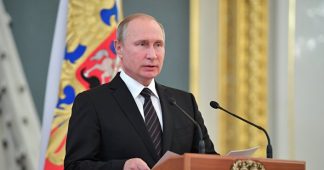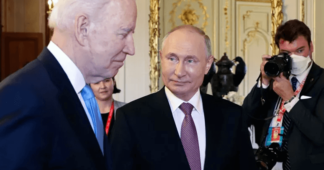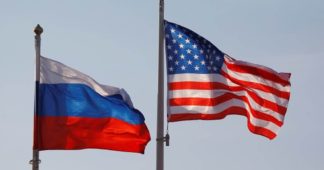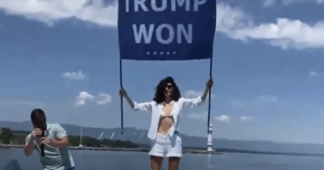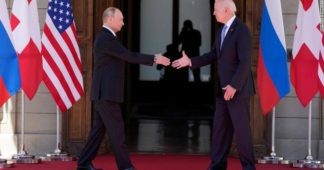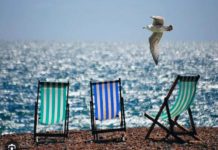By Israel Shamir
June 23, 2021
The Geneva rendezvous of two presidents remains an enigma. Why did they meet at all? They agreed that nuclear war is bad for all; fine! Didn’t they know that? Did they check on their partner’s soul, did they look into the eyes? Now we have some answers, based on conversations with my Israeli friends who had the advantage of hearing both sides, the Russians and the Americans. Our loyal readers deserve to know what actually happened in Geneva.
In brief: Biden came to tell Putin that the US is in good shape, has recovered from the pandemic, its economy is better than the Chinese one, and that he is in charge. The meeting was quite peaceful; Biden was rather mellow, while Secretary of State Blinken was in attack mode; he argued with his own president and tried to boss him about. The Russians were prepared for worse, much worse. They thought that the meetings of Biden with the G7 and with NATO would lead to a crescendo in Geneva, and were relieved to learn that this meeting was not a presentation of a united Western position towards Russia.
Prologue: A Preparation to the Summit
Putin gave an interview to NBC’s Keir Simmons. The idea was to prepare for the worst that could happen at the summit. Another man would tell Simmons to f*ck off after the first few questions, but Putin endured his immoderate rudeness and insults with a smile, like an Indian brave captured by enemies. He never descended to rudeness. Simmons spoke to Putin as Tim Sebastian on the BBC’s Hard Talk would; the Romans might have spoken thus to a king brought in chains to Rome. Putin endured all, and he became mentally prepared for rough treatment in Geneva. It was not necessary, in the end. The summit passed much better than the Western media expected.
I believe that the world needs Russia, not because it is wonderful, but so that the world does not fall under the iron heel of the Pentagon/CIA/Wall Street/NY Times. Russia is a guarantee of diversity. Marx in his days supported the colonisation of California; he thought it would be progressive. Trotsky, in his time, denied Marx, saying he would support the backward Indian chief fighting a progressive coloniser. Marx was on the side of progress, but I think Trotsky was right, fuck progress, diversity is more important.
At the summit
The only subject Biden spoke about on behalf of the united West was Belarus. He said the West had agreed to punish Lukashenko for the airliner landing and the dissident arrest. Putin replied without hesitation: Russia fully supports Belarus. They did what they were allowed to do by international law; they were within their rights. And nobody can punish Belarus without Russia’s consent.
On Ukraine, Putin ‘lectured’ the Americans (Blinken’s word). He said that Russia would agree to US participation in the Normandy process (this is a mediation process by Russia, Germany and France) but Merkel and Macron aren’t willing to let the US in. Biden said that the US could help to implement the Minsk agreements. (The Minsk agreements were signed between the Donbas and Kiev in the aftermath of the military defeat the Kiev army suffered at the hands the Donbas. By these agreements, Ukraine would become a federated republic with greater powers devolved to all its provinces including the Donbas. The Donbas would then reintegrate within the Ukraine. The Minsk agreements were never implemented, for Kiev by different subterfuges refused to devolve its powers. Russia wants the Minsk agreements to be implemented, and Putin called it the only way to settlement in the Ukraine). Biden’s words annoyed his Secretary of State Blinken. He said: it will be a waste of time, no need for us to get into it.
Referring to the Afghanistan withdrawal, Biden made an unexpected request. The US asked for temporary military bases to be established in Tajikistan and Uzbekistan, for twin purposes: (1) to facilitate the withdrawal of US troops and (2) to keep supplying the Kabul government with arms and ammunition after the withdrawal. This request was (almost) unexpected, but Putin promptly refused it for the following reasons. Such bases would invite the ire of the Taliban, leading to them being necessarily attacked, and that these two states would be drawn into war. This is unacceptable for Russia, as Russia has military obligations there, and these states are very close to Russia proper. In addition, China would consider the placement of military bases near China’s border a hostile act.
Biden stressed the temporary nature of such an arrangement. Putin could say there is nothing as lasting as a temporary arrangement. He flatly refused. This is probably wise: Russia withdrew from Afghanistan in 1989, and there was no reason to import the Afghan war into old Soviet territory in order to please the old adversary. Putin could also have added that the Uzbek constitution explicitly forbids the placing of foreign bases on its soil, for good reason: when there was a US base in Uzbekistan, it was used by the Americans to promote pro-American political leaders who stood in opposition to the then president Mr Karimov. But Putin didn’t go into it, to avoid the impression of passing the buck to the Uzbek leader. The buck stops at the Kremlin. His reference to Chinese interests made a lasting impression, the Americans say. In 2001, the very same Putin allowed the US the facilities to attack Afghanistan and transfer equipment via Russia. Twenty years passed, and Putin had learned that playing up to the Empire carries no reward. Then he helped the US, as a payback, the US instigated the Chechen rising and terror attacks. Putin said so in Munich, in 2007.
The Biden team tried to surprise and pressure the Russians regarding Syria. Even before the summit, the US team tried to attach to the three declarative paragraphs of their joint declaration (quite vague and meaningless by themselves) a very meaningful fourth paragraph. It actually called for the perpetuation of the present-day Syrian disorder, for the perpetual break up of Syria, covering it with insincere words about attending to humanitarian needs. There were through-border arrangements at Bab al-Hawa used by the US and its allies to resupply the Islamist rebels in Syria and to withdraw them in case of need. Through these arrangements, Americans removed the ISIS fighters and moved them to Afghanistan, so they would fight the Taliban. Preserving these arrangements would lead to the permanent separation of the Idlib enclave. Russia was against it, and so the Russians stated and explained in the UNSC (UN Security Council).
As this subject will come before the UNSC on July 10, Russia intends to veto (if necessary) any resolution that would perpetuate this open gate into Syria. Syrians are indeed in need of humanitarian help, but the Syrian government is much better prepared to deal with crisis and the distribution of aid than the Islamist fighters who steal everything and sell the stuff at Turkish markets. Putin said that. He could add that if the US is concerned with Syrians’ well-being, it might lift the sanctions that starve Syrians. Syria is under Western sanctions that forbid even the import of food, medicines and fuel. In addition, the US steals Syrian oil and Iranian oil on its way to Syria. US appeals about the humanitarian crisis in Syria remind one of the father-killer who asks for mercy as an orphan. There would be no crisis in Syria if the West had not supported the Islamist rebels and sanctioned Syria to death.
Putin didn’t go into it. The Russian Foreign Minister Lavrov proposed to set up negotiations for the whole of the MENA (Middle East – North Africa) area, including Syria and Libya. Within such a framework, the question of Bab al-Hawa could be discussed. He also suggested that the West should stop trying to remove President Assad. However, the US side refused this suggestion. No agreement was reached, and Biden referred to it in his press conference, repeating all the hypocritical regrets about the Syrian crisis.
The sides discussed cyber-security, too. As we know, Biden proposed a list of 16 items of critical infrastructure that should not be attacked by hackers. The sides should arrest all hackers who interfere with these items. Biden didn’t try to blame Putin, whether personally or Russia as a state of hacking the US infrastructure. Biden stressed that he was referring to individual rogue hackers who do these things. Putin replied that actually the US territory is the main source of hacker attacks, with Canada a distant second. (Russian territory keeps the fifth or sixth place in this ranking). Putin said that Russia received ten US requests for assistance in connection with the hacker attacks; all ten were responded to and dealt with. At the same time, Russia lodged 45 requests last year and 35 requests this year referring to US-based hacker attacks on Russian assets. All of them remained unanswered. The US simply never responds.
Biden referred to China, but without (as was usual for Trump) anti-Chinese vehemence. He said that the US economy is much stronger than the Chinese one; that they have recovered from the Covid crisis. He expressed his commiseration to Russia that she shares a thousand-miles-long border with China; that should bother the Russians immensely, he said. He repeated this statement at his press conference. The Russians were amazed by this naïve attempt to draw a wedge between Russia and China. Putin said that China is a friend of Russia; their friendship is not aimed against the US, but it was caused by the previous US administration’s efforts to antagonise both Russia and China, by declaring Russia an enemy. At his press conference, Putin said that Russia is not worried about Chinese aircraft-carriers, for their border is mainly on the land; and anyway China has so few carriers compared to the US that it is not worthy of mention.
Speaking of the economy, Putin said that US companies suffer in the Russian market because of the US sanctions. He suggested establishing a bilateral commission to promote economic relations. Biden looked at this favourably, but he switched the subject to three Americans who are now in Russian prisons, one for spying, one for financial crimes and one for a drunken brawl with police. They should be released, said Biden, for business to progress. Putin retorted that the US kidnaps Russian citizens in third countries and extradites them to America to be tried in American courts.
Biden referred to Navalny and to the political opposition in Russia. Putin retorted that the Capitol demo (Jan 6, 2021) participants have been prosecuted and expect long terms in the US jails. How can you compare, said Blinken, these internal terrorists who stormed the Capitol with peaceful opposition. Putin could have shown the videos of peaceful entry into the Capitol, when the protesters were waved in by police, he could also show the videos of wild attacks on the police by Navalny supporters in Russia; he referred to this in his press conference.
Biden referred to the Arctic, in rather favourable (to Russia) key. Blinken intervened and accused the Russians in militarising Arctic. Putin objected. He said Russia is against the militarisation of the Arctic; Russia repairs its military infrastructure in the Arctic that existed in Soviet days and has been decaying ever since. The Russians suggested to reconvene regular meetings of the Chiefs of Staff that were held until 2014, to deal with the question. The American side did not respond to this suggestion.
The sides agreed to return ambassadors to Moscow and Washington, respectively. It remains to be seen how this will go. Before the Russian ambassador had been recalled home for consultations, he was cold-shouldered in Washington. He could not reach American officials; due to Kremlingate, they were afraid to meet with Russian diplomats. If this attitude continues the return of the ambassador will be of little use.
The sides agreed to continue their negotiations in July; probably cyber security and other topics will be discussed then. Putin suggested that a summit of the five UNSC permanent members be arranged; this is his old idea that he has voiced many times, but it was not well received by the Biden team. The summit didn’t produce any tangible results; however, the presidents have met. Biden was lucid and coherent. He is likely to last and survive many of those who spoke of his dementia. He was also quite friendly to Putin; the role of ‘bad cop’ was taken by Blinken who was accompanied by Victoria (“f*ck EU”) Nuland.
Biden’s reference to his mother’s words was quite reasonable and well received. Biden quoted his mother saying that unintentional conflict could be worse than deliberate; meaning that Russia and the US should try to avoid unintentional conflicts by means of meetings and negotiations. This is also the Russian view. Biden got tired rather fast, and the summit was adjourned before time.
Press Conference
After the meeting, they had their respective press conferences. Unusually, the press conferences were totally separate, and held in different locations. American and other foreign journalists attended the Putin conference; they asked impertinent and offensive questions. Putin answered every question. Russian journalists weren’t admitted to the Biden conference. Biden was asked questions that had been worked out in advance. There was not a single daring or even difficult question. Did Putin promised to behave? – this sort of question. None of the hard-boiled questions the US journos asked Trump. Biden had the extra advantage of speaking after Putin, so he knew what Putin answered.
Biden had for his conference a trump spot overlooking Lake Geneva; thus he had the advantage of a good picture. Putin was to speak first, in a tent, without a view. On the other hand, Biden stood under a scorching sun and sweated a lot; Putin had air conditioning. Putin was not afraid to answer any questions, did not mumble, and answered harshly, but not rudely – although some questions begged for reciprocal rudeness.
Apparently, the High Contracting Parties have not agreed on anything, which is already good. The Western media expected that Biden would drag out Putin, he would repent and promise to behave himself. It did not work out. The arrogance of the American side was striking at every step. It was quite difficult for the Russian president, although he is strong, energetic and easily finds the right words. He had no sycophantic media as Biden had. Biden became angry at a question and suggested that the journalist should change his occupation. Putin kept cool.
Probably most embarrassing was the opening of the Biden Press Conference when he spoke of America’s commitment to democracy and openness. I heard such speeches when I was forty or fifty years younger, but now they sound improbable. Alas, the US is not the free country it was once upon a time. However, the summit concluded without tragic consequences, which is already good. Life is going on.
Summit Aftermath
In Russia, there was one drastic change. If before Putin’s voyage, Russia was quite peaceful and content, immediately as the great man went away, Moscow descended into a spasm of vaccination fever. Moscow Mayor Mr Sergei Sobyanin, who ordered a very severe lockdown in spring 2020, turned back to his bad old ways and began enforcing vaccination. Until June 16, vaccination was a perfectly voluntary affair in Russia; available to all willing but nobody was forced to vaccinate. At the beginning of June, Russian officials said the pandemic was behind us. Putin explicitly said nobody should be forced to vaccinate. And apparently only 9% of Russia’s adult population went to get a jab. People were quite content and managed all right.
All that changed in one day. Now there is non-stop propaganda for vax; in social networks, influencers preach hate to those irresponsible people who refused the jab. They are called “murderers”; many employers intend to fire their non-vaccinated workers. Moscow again introduced QR-codes for restaurants. In the city of Nizhny, non-vaccinated couples can’t get married. In the south, churches and mosques were closed to worshippers. The switch is so sudden, so brutal and unexpected! At the same time, flights to Turkey and other holiday destinations have been resumed after a long break. The Euro 2020 football matches go on in the filled-to-its-capacity stadium of St Petersburg; the city applied to have more matches of the final games.
The subject of vaccination or Covid was not discussed at the summit, so we can’t say that it was a US initiative. Apparently, Covid Masters had noticed that the Russians have it too good. Dr Alexander Ginzburg, the head of Gamaleya, the Sputnik V vaccine developer and producer, advised people to revaccinate in order to save themselves from the Indian variant, the fearsome Delta, even if they are vaccinated.
I can offer an additional explanation. The Russian upper classes want to fit into a European way of living. Peter the Great, the first Russian Emperor, was so fond of European ways that he fought with the beards the natives used to grow. He even chopped the beards of disobedient boyars with his mighty axe, the stories tell. The Russian upper classes wore wigs; they accepted tobacco smoking in the 18th century and gave it up at the end of 20th century. The fashion was always fiercely enforced. Perhaps now the people of Moscow with their tendency to follow European fashion decided to accept vaccines and masks.
Another explanation connects the change to vaccine output. The production output was quite small; though it was enough for those willing to vaccinate, it won’t be sufficient if all Russians would like to take the jab. Now the output capacity has grown; and the vaccine can’t be stored forever, it has to be used. This could be a plausible explanation: desire to utilise the produced vaccines that could not be sold abroad as the West effectively blocked sales of Sputnik and other Russian vaccines on its territory. They wanted to keep the market for Pfizer and Moderna, instead of sharing the market for the greater benefit of the population.
(A similar development occurred in Israel, where they had a million of ready vaccines near their final validity date. They tried to give them to Palestine in exchange for newer vaccines in September, but the Palestinians refused for they could not use them within one week of validity. Then the Israelis decided to vaccinate children.)
Putin never got involved in the covid restriction measures. He didn’t go as far as President Lukashenko who just ignored Covid, but he never called for lockdown or for mandatory vaccination. It was delegated to local authorities, and they usually were sufficiently prompt, especially in Moscow. Perhaps the Mayor took the initiative into his hands while Putin was engaged elsewhere. Putin is a powerful leader, no doubt, but he is not an omnipotent ruler of Russia. He has to consider other opinions and positions, too.
Bear in mind that China also has a similar drive. For a year, it was considered the Chinese had beaten the virus down. It was possible to vaccinate but few did. In March 2021, one million Chinese received a jab; now 700 million got at least one shot. And in China, too, the authorities have made life miserable for those unwilling to accept. The Ukraine, however, has no vaccination. They refused the Russian vaccine; the West never provided them with Western vaccines. But nothing especially bad happened to the Ukrainians. Instead of vaccination, they treat covid with Ivermectin, and their results are better than those in neighbouring (vaccinated) Poland.
Anyway, in Geneva the presidents didn’t discuss Corona crisis or vaccinations; so apparently the present Russian rush for vaccinations was not directly connected with the summit, just with the Putin’s temporary departure, along the lines of “When the cat’s away the mice will play”. This is quite a relief: I was worried that the vaccination increase was a Western demand. Now we know it was not.
Published at www.unz.com
